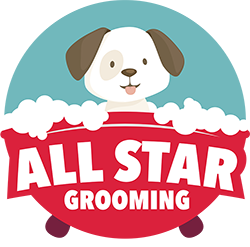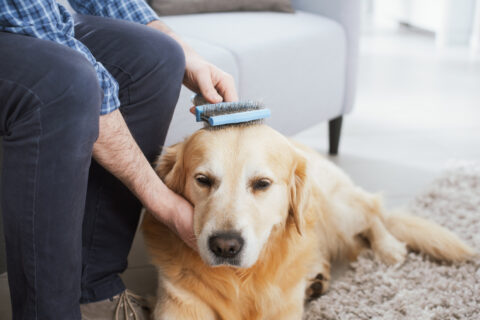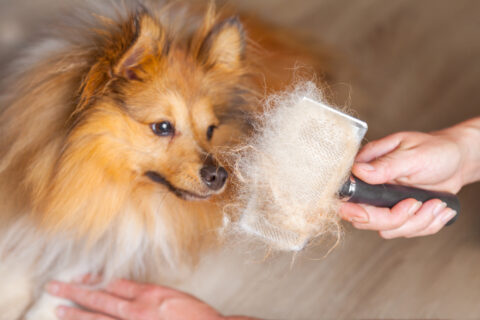Protect Your Pup by Avoiding These Toxic Garden Plants
Gardening season is back! Soon again, our backyards will be filled with beautiful flowers and fresh produce to enjoy all season long. Unfortunately, not everyone can enjoy it as many of the common plants people choose for their gardens are actually toxic to dogs when consumed. It’s important as a dog owner to research what plants are poisonous prior to purchasing to avoid health and emotional issues in your pup.
Common telltale signs of poisoning in dogs include drooling/foaming at the mouth, lethargy, depression, and gastrointestinal irritation such as vomiting and diarrhea. If you notice these or something that feels off with your dog, do not hesitate to call your veterinarian or an emergency clinic to ensure they receive the proper treatment. Continue reading to learn about a few common garden plants that are toxic to dogs and the symptoms of each.
Flowers
Daisy

Commonly found in gardens and flower bouquets, daisies are widely used flowers that are unfortunately problematic for dogs. If consumed, your dog may experience incoordination, excessive drooling, vomiting, diarrhea and a dermal allergic reaction that can irritate the skin.
Azalea
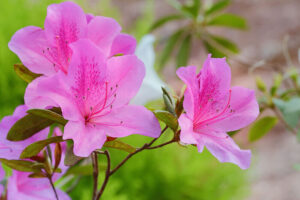 Popular in backyards, and highly toxic for dogs. When ingested, Azaleas can generate gastrointestinal irritation, weakness and discoordination. Sometimes, the reaction can be very serious and cause a cardiac failure or coma, and possibly be fatal.
Popular in backyards, and highly toxic for dogs. When ingested, Azaleas can generate gastrointestinal irritation, weakness and discoordination. Sometimes, the reaction can be very serious and cause a cardiac failure or coma, and possibly be fatal.
Daffodil
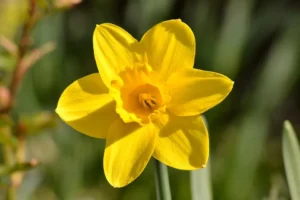 They sure are pretty, but sadly, daffodils cause severe reactions in dogs if ingested. This includes hypersalivation, low blood pressure, muscle convulsions or tremors, irregular heartbeat and gastrointestinal upset.
They sure are pretty, but sadly, daffodils cause severe reactions in dogs if ingested. This includes hypersalivation, low blood pressure, muscle convulsions or tremors, irregular heartbeat and gastrointestinal upset.
Tulip
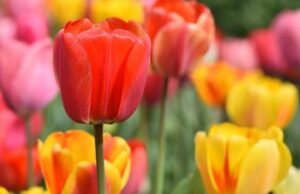 It may be a spring staple, but eating tulips, especially the bulbs of the plants, can cause our poor pups excessive drooling, depression, oral irritation and nausea that could lead to vomiting and/or diarrhea.
It may be a spring staple, but eating tulips, especially the bulbs of the plants, can cause our poor pups excessive drooling, depression, oral irritation and nausea that could lead to vomiting and/or diarrhea.
Vegetables and Herbs
Tomato Plant
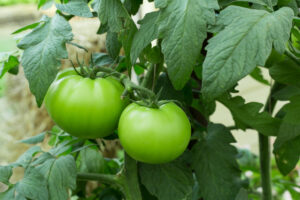 Though tomatoes themselves are not toxic to dogs, the vines, leaves and unripe tomatoes of the growing plants are very poisonous. If ingested, symptoms include severe gastrointestinal upset, weakness, slow heart rate, dilated pupils and CNS depression where the dog’s central nervous system is slowed.
Though tomatoes themselves are not toxic to dogs, the vines, leaves and unripe tomatoes of the growing plants are very poisonous. If ingested, symptoms include severe gastrointestinal upset, weakness, slow heart rate, dilated pupils and CNS depression where the dog’s central nervous system is slowed.
Chives
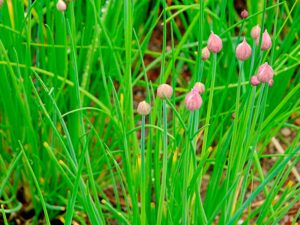 Dogs usually can handle small doses of this herb, however, it is still best to avoid planting chives in your garden to be cautious. If your pup does consume these, it can cause abdominal pain, nausea, oral irritation, exercise intolerance and an elevated heart and respiratory rate.
Dogs usually can handle small doses of this herb, however, it is still best to avoid planting chives in your garden to be cautious. If your pup does consume these, it can cause abdominal pain, nausea, oral irritation, exercise intolerance and an elevated heart and respiratory rate.
Garlic
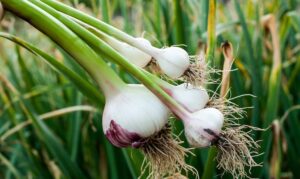 Small servings of garlic can be handled by certain dogs, but larger portions of the plant itself can promote serious health problems if consumed. Symptoms such as pale gums, vomiting, diarrhea, rapid breathing, abdominal pain and an elevated heart rate may occur.
Small servings of garlic can be handled by certain dogs, but larger portions of the plant itself can promote serious health problems if consumed. Symptoms such as pale gums, vomiting, diarrhea, rapid breathing, abdominal pain and an elevated heart rate may occur.
Onions and Shallots
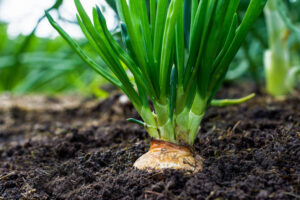 This primary cooking ingredient unfortunately is harmful to dogs when ingested and should be used carefully around your pups. Signs of consumption include reddish urine, lethargy, decreased appetite, panting and excessive salivation.
This primary cooking ingredient unfortunately is harmful to dogs when ingested and should be used carefully around your pups. Signs of consumption include reddish urine, lethargy, decreased appetite, panting and excessive salivation.
Next time you’re thinking about going to the nursery, keep in mind plants that are unsafe for dogs to make sure they remain unharmed. Here at All Star Grooming, we make it our priority to keep your dogs looking and feeling their best, but most importantly, our main concern is that your pup is healthy and happy.
We hope this was helpful for all the dog parents out there as we care deeply about the well-being of your pups and would love to continue caring for their grooming needs.
Resources:
https://blog.homesalive.ca/dog-blog/dangerous-garden-plants-for-dogs
https://www.aspcapetinsurance.com/resources/plants-toxic-to-dogs/
